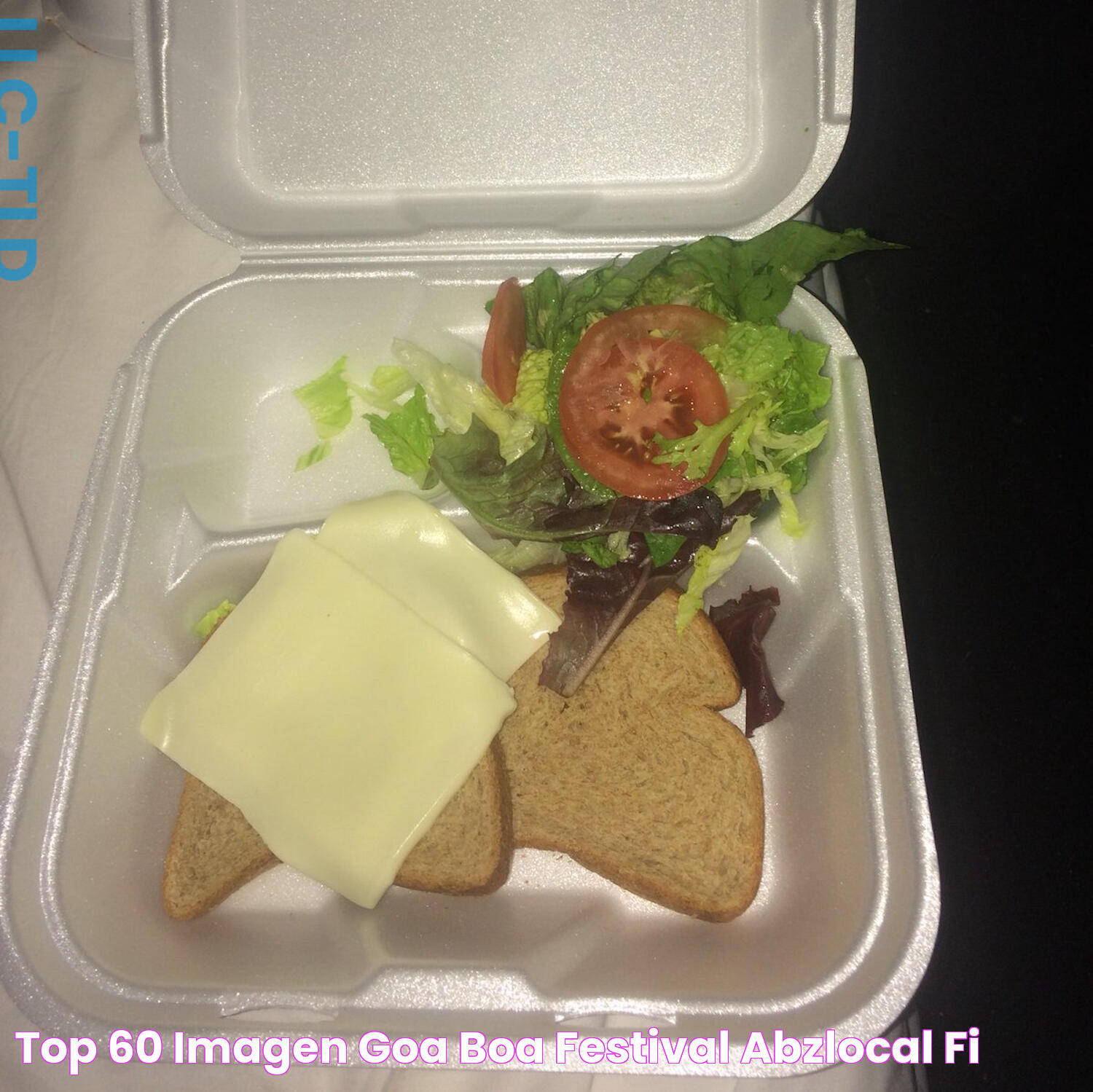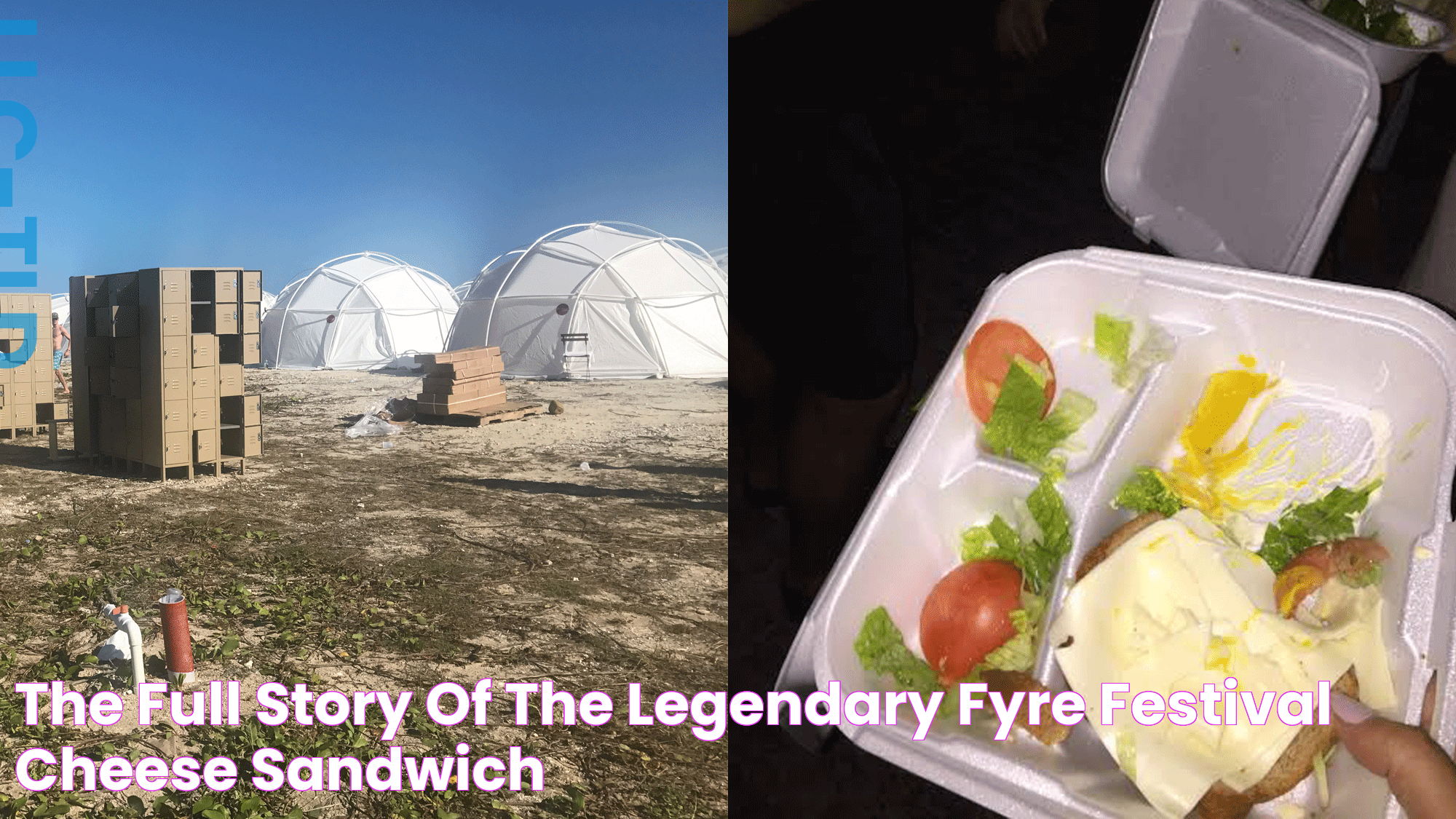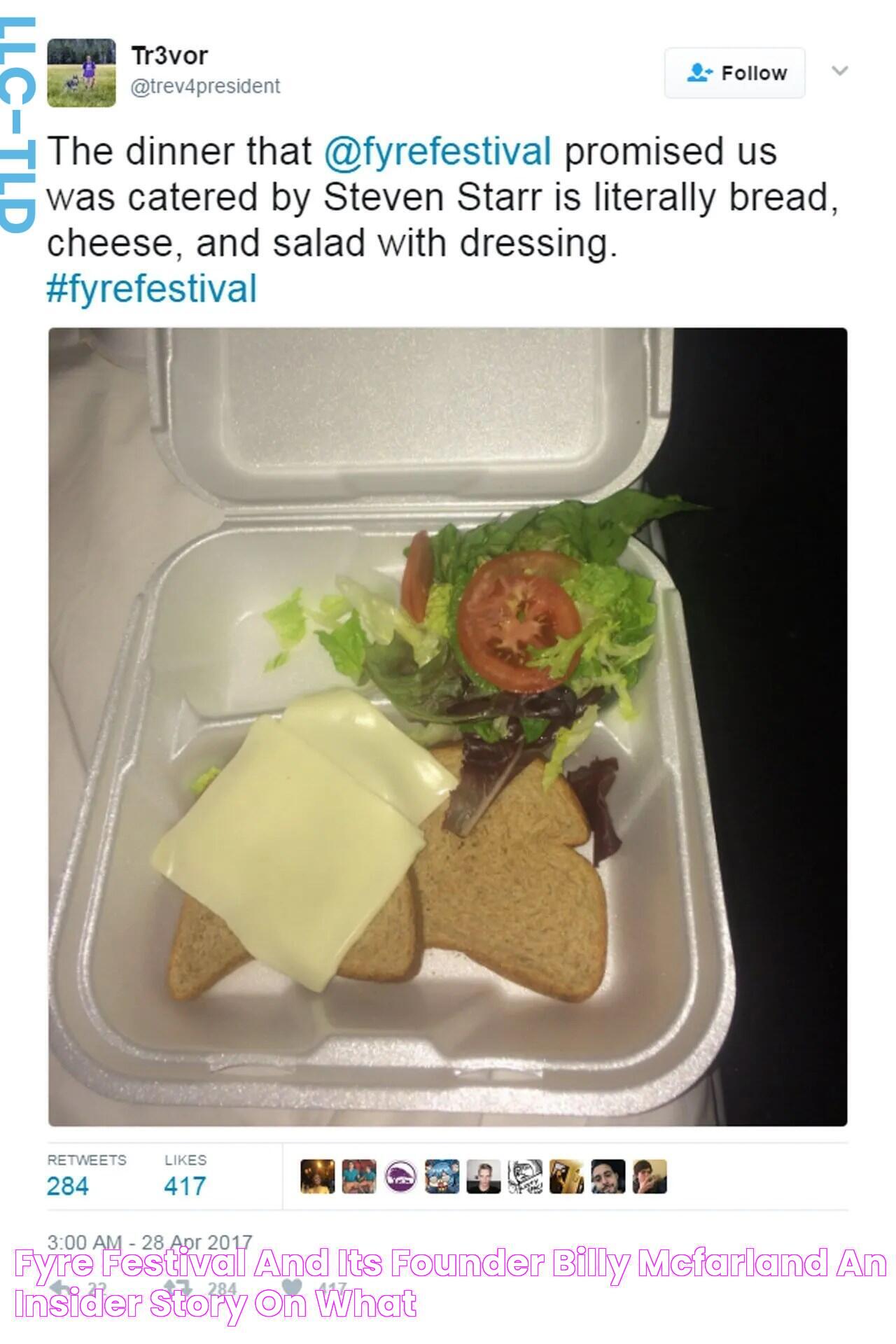The Truth About Fyre Festival's Notorious Food Disaster
Fyre Festival food became infamous for its poor quality and lack of availability at the disastrous 2017 event. Attendees were promised gourmet meals by celebrity chef Stephen Starr, but instead received pre-packaged sandwiches and cheese.
The food situation at Fyre Festival was just one of many problems that plagued the event. The festival was plagued by disorganization, lack of infrastructure, and security issues. Attendees were left stranded on a remote island with little food, water, or shelter. The festival was eventually canceled and its organizers were charged with fraud.
The Fyre Festival food scandal is a cautionary tale about the importance of planning and preparation. It also highlights the need for transparency and accountability in the event planning industry.
Read also:The Ultimate Guide To Apponfly A Powerful App Testing Tool
Fyre Festival Food
Fyre Festival food became infamous for its poor quality and lack of availability at the disastrous 2017 event. Attendees were promised gourmet meals by celebrity chef Stephen Starr, but instead received pre-packaged sandwiches and cheese.
- Promised
- Gourmet
- Pre-Packaged
- Inadequate
- False Advertising
- Disastrous
- cautionary tale
The Fyre Festival food scandal highlights the importance of planning and preparation, as well as the need for transparency and accountability in the event planning industry. It also serves as a cautionary tale about the dangers of false advertising and unrealistic expectations.
1. Promised
In the context of the Fyre Festival, the word "promised" takes on a particularly ironic and negative connotation. Attendees were promised a luxurious and unforgettable experience, complete with gourmet food and celebrity chefs. However, the reality was far from what was promised. The food was pre-packaged, of poor quality, and in short supply.
- Unfulfilled Promises: The Fyre Festival organizers made a number of promises to attendees that they failed to keep. These included promises about the food, the accommodations, and the entertainment.
- False Advertising: The Fyre Festival website and promotional materials featured images of gourmet food and celebrity chefs. However, these images were misleading. The food that was actually served at the festival was far from gourmet.
- Disappointed Attendees: The failure of the Fyre Festival organizers to deliver on their promises left attendees feeling disappointed and cheated. Many attendees felt that they had been misled by the festival's marketing.
- Damaged Reputation: The Fyre Festival scandal damaged the reputation of the festival organizers and the event planning industry as a whole. It also eroded trust in the festival experience.
The Fyre Festival is a cautionary tale about the dangers of making promises that you cannot keep. It is also a reminder that consumers should be wary of false advertising.
2. Gourmet
The word "gourmet" is often used to describe food that is of high quality and prepared with great care. It is often associated with fine dining and expensive restaurants. However, the term "gourmet" can also be used to describe food that is simply delicious and made with quality ingredients, regardless of the setting.
- Quality Ingredients: Gourmet food is typically made with high-quality ingredients. This means using fresh, seasonal produce, and avoiding processed foods and artificial flavors.
- Preparation: Gourmet food is often prepared with great care and attention to detail. Chefs may use special techniques or cooking methods to create dishes that are both delicious and visually appealing.
- Presentation: Gourmet food is often presented in a visually appealing way. This may involve using garnishes, sauces, and other elements to create a dish that is both beautiful and delicious.
- Experience: Gourmet food is often about more than just the taste. It is about the entire dining experience, from the atmosphere of the restaurant to the service.
The term "gourmet" can be applied to any type of food, regardless of the cuisine or setting. It is simply a way of describing food that is of high quality and prepared with care.
Read also:Optimize Your Business With 9bids The Ultimate Digital Procurement Solution
3. Pre-Packaged
The term "pre-packaged" refers to food that has been prepared and packaged in advance, typically in a factory or other food processing facility. Pre-packaged food is often sold in supermarkets, convenience stores, and other retail outlets. It is popular among consumers because it is convenient and has a long shelf life.
- Convenience: Pre-packaged food is very convenient. It is easy to store, transport, and prepare. This makes it a popular choice for busy people who do not have a lot of time to cook.
- Shelf Life: Pre-packaged food has a long shelf life. This is because it is typically processed and packaged in a way that prevents spoilage. This makes it a good option for people who want to stock up on food for emergencies or for long trips.
- Variety: Pre-packaged food is available in a wide variety of flavors and styles. This makes it easy to find something that appeals to everyone.
- Cost: Pre-packaged food is often less expensive than fresh food. This is because it is produced in large quantities and does not require as much labor to prepare.
However, pre-packaged food also has some disadvantages. One disadvantage is that it is often less nutritious than fresh food. This is because it is often processed and contains added preservatives. Another disadvantage is that it can be more expensive than fresh food, especially if it is organic or made with high-quality ingredients.
Overall, pre-packaged food has both advantages and disadvantages. It is important to weigh the pros and cons before deciding whether or not to purchase pre-packaged food.
4. Inadequate
In the context of Fyre Festival food, the term "inadequate" is a gross understatement. Attendees were promised a luxurious culinary experience, but what they received was far from it. The food was pre-packaged, of poor quality, and in short supply. This led to widespread hunger and frustration among attendees.
- Quantity: The amount of food available at Fyre Festival was simply inadequate. Attendees were given meager portions of pre-packaged sandwiches and cheese, which were not enough to sustain them for the duration of the festival.
- Quality: The quality of the food at Fyre Festival was also very poor. The sandwiches were stale and the cheese was processed. Many attendees reported getting sick from the food.
- Variety: The food options at Fyre Festival were extremely limited. Attendees were given the same pre-packaged sandwiches and cheese for every meal. This lack of variety made the food even more unappealing.
- Preparation: The food at Fyre Festival was not prepared with care. The sandwiches were thrown together and the cheese was not even melted. This lack of preparation made the food even more unappetizing.
The inadequate food at Fyre Festival was a major contributing factor to the overall disaster of the event. Attendees were left hungry, frustrated, and sick. The food situation is a reminder of the importance of planning and preparation when hosting an event. It is also a reminder that attendees should be wary of events that make unrealistic promises about food and other amenities.
5. False Advertising
False advertising is a serious problem that can have a significant impact on consumers. It occurs when a company makes false or misleading claims about its products or services. This can lead consumers to make purchasing decisions that they would not have made if they had known the truth.
- Misrepresentation of Facts: False advertising often involves misrepresenting facts about a product or service. For example, a company may claim that its product is made with all-natural ingredients when it actually contains artificial ingredients.
- Omission of Material Facts: False advertising can also involve omitting material facts about a product or service. For example, a company may fail to disclose that its product has been recalled due to safety concerns.
- Deceptive Packaging: False advertising can also occur through deceptive packaging. For example, a company may use packaging that makes its product appear larger than it actually is.
- Bait-and-switch Tactics: False advertising can also involve bait-and-switch tactics. For example, a company may advertise a product at a low price to attract customers, but then switch to a higher-priced product when the customer arrives at the store.
The Fyre Festival food scandal is a prime example of false advertising. The festival organizers promised attendees a luxurious culinary experience, but what they received was far from it. The food was pre-packaged, of poor quality, and in short supply. This led to widespread hunger and frustration among attendees.
The Fyre Festival food scandal is a reminder of the importance of being aware of false advertising. Consumers should be wary of companies that make unrealistic promises about their products or services. If a deal seems too good to be true, it probably is.
6. Disastrous
The Fyre Festival was a complete and utter disaster. The food was one of the many things that went wrong. The food was pre-packaged, of poor quality, and in short supply. This led to widespread hunger and frustration among attendees.
The food situation at Fyre Festival is a good example of how a seemingly minor detail can have a major impact on an event. The lack of adequate food led to widespread hunger and frustration, which in turn contributed to the overall negative experience of the festival.
The Fyre Festival food scandal is a cautionary tale for event planners. It is important to plan ahead and make sure that there is enough food for all attendees. It is also important to make sure that the food is of good quality and that it is prepared in a sanitary manner.
7. Cautionary Tale
The Fyre Festival food scandal is a cautionary tale for event planners and attendees alike. It is a reminder that even the most well-planned events can go wrong, and that it is important to be prepared for the unexpected.
- Planning and Preparation: The Fyre Festival organizers failed to adequately plan and prepare for the event. They did not secure enough food for the attendees, and they did not have a plan in place for how to handle the large crowds. As a result, the festival was a complete disaster.
- Transparency and Communication: The Fyre Festival organizers were not transparent with the attendees about the problems that they were facing. They continued to promise a luxurious experience, even though they knew that they could not deliver. This lack of transparency and communication led to widespread anger and frustration among the attendees.
- Realistic Expectations: The Fyre Festival attendees had unrealistic expectations about the event. They were promised a luxurious experience, but they paid a relatively low price for their tickets. This disconnect between price and expectations led to widespread disappointment.
- Accountability: The Fyre Festival organizers have been held accountable for their actions. They have been sued by the attendees, and they have been charged with fraud. This accountability is important to deter other event planners from making the same mistakes.
The Fyre Festival food scandal is a cautionary tale that highlights the importance of planning, preparation, transparency, communication, realistic expectations, and accountability. By learning from the mistakes of the Fyre Festival organizers, we can help to prevent future disasters.
FAQs about Fyre Festival Food
The Fyre Festival food scandal was a major that raised many questions and concerns. Here are some of the most frequently asked questions about Fyre Festival food:
Question 1: What was the quality of the food at Fyre Festival?The food at Fyre Festival was of extremely poor quality. Attendees were promised gourmet meals by celebrity chef Stephen Starr, but instead received pre-packaged sandwiches and cheese. The food was also in short supply, and many attendees went hungry.
Question 2: Why was the food at Fyre Festival so bad?There are several reasons why the food at Fyre Festival was so bad. First, the festival organizers failed to plan and prepare adequately. They did not secure enough food for the attendees, and they did not have a plan in place for how to handle the large crowds. Second, the festival organizers were not transparent with the attendees about the problems that they were facing. They continued to promise a luxurious experience, even though they knew that they could not deliver. Third, the attendees had unrealistic expectations about the event. They were promised a luxurious experience, but they paid a relatively low price for their tickets. This disconnect between price and expectations led to widespread disappointment.
Question 3: What are the lessons that can be learned from the Fyre Festival food scandal?There are several lessons that can be learned from the Fyre Festival food scandal. First, it is important to plan and prepare adequately for events. Second, it is important to be transparent with attendees about any problems that may arise. Third, it is important to set realistic expectations for events. Finally, it is important to hold event organizers accountable for their actions.
The Fyre Festival food scandal is a cautionary tale about the importance of planning, preparation, transparency, communication, realistic expectations, and accountability. By learning from the mistakes of the Fyre Festival organizers, we can help to prevent future disasters.
Conclusion: The Fyre Festival food scandal was a major event that raised many questions and concerns. By understanding the answers to these FAQs, we can learn from the mistakes of the Fyre Festival organizers and help to prevent future disasters.
Transition to the next article section: The Fyre Festival food scandal is a reminder that even the most well-planned events can go wrong. It is important to be prepared for the unexpected and to have realistic expectations.
Tips to Avoid a Fyre Festival Food Disaster
The Fyre Festival food scandal was a major event that raised many questions and concerns. By following these tips, you can help to prevent a similar disaster from happening at your next event.
Tip 1: Plan and Prepare Adequately
The most important step in preventing a food disaster is to plan and prepare adequately. This means securing enough food for all attendees, having a plan in place for how to handle large crowds, and ensuring that the food is properly prepared and stored.
Tip 2: Be Transparent with Attendees
It is important to be transparent with attendees about any problems that may arise. If you are experiencing delays or shortages, let attendees know as soon as possible. This will help to manage their expectations and prevent them from becoming frustrated.
Tip 3: Set Realistic Expectations
It is important to set realistic expectations for your event. Do not promise more than you can deliver. If you are offering a limited menu or if there is a chance of food shortages, make sure to communicate this to attendees in advance.
Tip 4: Hire a Reputable Caterer
If you are not experienced in event planning, it is best to hire a reputable caterer. A good caterer will be able to help you plan your menu, prepare the food, and handle any unexpected challenges.
Tip 5: Have a Backup Plan
It is always a good idea to have a backup plan in case of unexpected events. This could involve having extra food on hand or arranging for a delivery from a local restaurant.
Summary of Key Takeaways or Benefits:
- Planning and preparation are key to preventing a food disaster.
- Be transparent with attendees about any problems that may arise.
- Set realistic expectations for your event.
- Hire a reputable caterer.
- Have a backup plan in case of unexpected events.
Transition to the article's conclusion:
By following these tips, you can help to ensure that your next event is a success. Remember, the most important thing is to plan and prepare adequately, and to be transparent with attendees about any potential problems.
Conclusion
The Fyre Festival food scandal was a major event that raised many questions and concerns. By understanding the answers to these FAQs, we can learn from the mistakes of the Fyre Festival organizers and help to prevent future disasters.
The most important lesson to learn from the Fyre Festival food scandal is the importance of planning and preparation. Event planners must secure enough food for all attendees, have a plan in place for how to handle large crowds, and ensure that the food is properly prepared and stored. It is also important to be transparent with attendees about any problems that may arise, and to set realistic expectations.
By following these tips, event planners can help to ensure that their next event is a success. Remember, the most important thing is to plan and prepare adequately, and to be transparent with attendees about any potential problems.
Explore Gholdengo Smogon: The Ultimate Guide To Using This Unique Pokemon
Master Bokuto Misaki: A Masterful Practitioner Of Aikido
Who Is Sophie Faldo's Husband? Discover The Truth!


